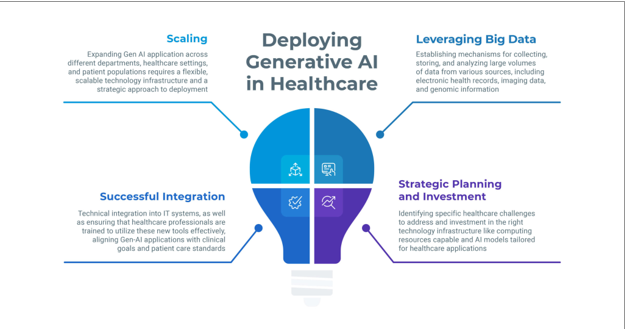The healthcare sector is undergoing a massive transformation—driven not just by medical advancements but by powerful new technologies like generative AI. From diagnostics to personalized care plans, AI is rapidly becoming a vital part of healthcare’s digital backbone. Organizations that embrace these innovations are seeing improvements in operational efficiency, clinical outcomes, and patient satisfaction.
One of the most promising developments is the rise of generative AI in healthcare, which is revolutionizing the way medical professionals deliver services and how patients engage with healthcare systems.
The Shift from Traditional to AI-Driven Healthcare
For decades, healthcare systems have relied on manual processes, paper records, and fragmented technologies. While digital transformation has been underway for years, generative AI is now accelerating that shift by making it possible to automate and optimize complex tasks.
Bridging Gaps in Medical Workflows
Generative AI models can summarize medical histories, generate patient discharge summaries, and even assist in writing diagnostic reports—all in seconds. This drastically reduces administrative workload for clinicians, giving them more time for patient interaction.
Enhancing Decision Support Systems
AI-driven decision support tools analyze vast amounts of structured and unstructured data, providing insights that can help doctors make more informed treatment decisions. With generative AI, systems can now go a step further—predicting complications, suggesting therapies, and tailoring interventions for each patient.
Use Cases: Where Generative AI Is Already Making an Impact
The possibilities for AI in healthcare are expansive, but several applications are already proving their worth.
Medical Imaging Interpretation
AI algorithms can now assist in reading and interpreting X-rays, MRIs, and CT scans with remarkable speed and accuracy. By flagging anomalies early, these systems can support faster diagnoses and improve patient outcomes.
Personalized Treatment Plans
AI agents analyze a patient’s genetics, lifestyle, and medical history to recommend highly personalized treatments. This is especially valuable in oncology, where precision therapies can dramatically improve prognosis.
Virtual Health Assistants
Conversational AI agents are being deployed in clinics and via telemedicine platforms to handle routine queries, schedule appointments, and guide patients through care processes. These virtual assistants offer 24/7 support, enhancing patient experience while reducing staffing costs.
AI Agents: The Backbone of Intelligent Healthcare Operations
Many of these use cases are made possible by sophisticated AI agents—custom-built systems designed to perform specific healthcare functions.
Platforms like ZBrain offer pre-trained and customizable AI agents tailored for healthcare operations. These agents can automate everything from patient onboarding and claims validation to medical coding and document analysis, drastically reducing turnaround times and operational bottlenecks.
Benefits of AI Adoption in Healthcare
While the technology is impressive, its real-world value is measured by the benefits it delivers.
Improved Patient Outcomes
With quicker diagnoses, personalized treatments, and around-the-clock support, patient health improves across the board. AI also reduces the margin of human error, ensuring more accurate care.
Reduced Costs
Hospitals and clinics often operate under tight budgets. By automating repetitive tasks, AI frees up human resources and helps organizations cut administrative costs while still scaling services.
Enhanced Compliance and Documentation
AI agents can automatically validate documentation against healthcare standards and policies, ensuring regulatory compliance and audit readiness—an especially important aspect for institutions dealing with insurance claims and government healthcare programs.
Addressing Concerns: Ethics, Privacy, and Bias
Despite its promise, the use of generative AI in healthcare comes with challenges. Concerns around data privacy, bias in AI models, and the ethics of decision-making persist.
To mitigate these, leading platforms implement rigorous security protocols, maintain transparency in model training, and constantly refine models using real-world feedback to reduce bias. Human-in-the-loop systems also ensure that AI remains a support tool—not a replacement for clinical judgment.
The Road Ahead: What to Expect
The future of AI in healthcare looks promising. As regulatory bodies adapt to evolving technologies and more healthcare professionals embrace digital tools, generative AI will play an even greater role.
Key trends to watch:
- Integration of AI into electronic health record (EHR) systems
- Use of multimodal AI for combining imaging, genomics, and text-based data
- AI-driven clinical trial design and drug discovery acceleration
Final Thoughts
Generative AI is more than just a buzzword—it’s a practical, powerful solution that’s redefining how we think about patient care, operations, and medical research. The organizations adopting this technology today will shape the standard of care for tomorrow.
By leveraging platforms that offer healthcare-specific generative AI tools and customizable agents, hospitals and providers can stay ahead of the curve, deliver superior care, and do more with less.


